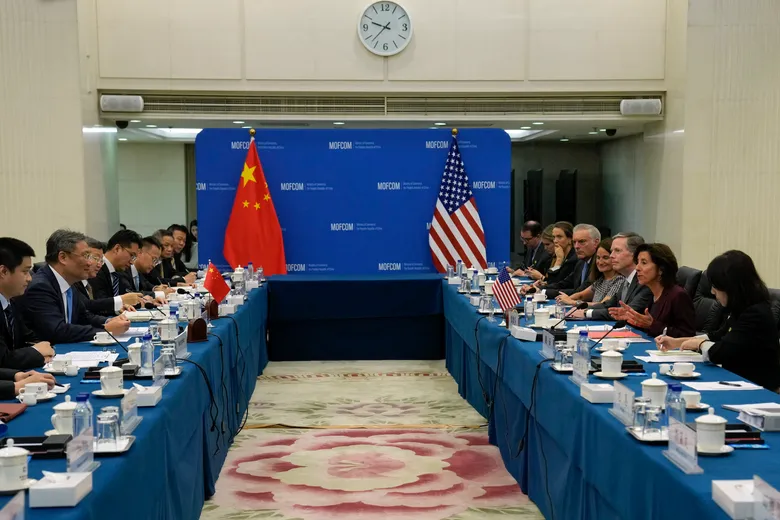(AP) BEIJING — On Monday, when Gina Raimondo began a visit to Beijing intended at thawing frigid relations, the two sides professed a willingness to improve trade circumstances, but neither side appeared willing to make compromises on the other’s primary demands.
In July, Raimondo joined other American officials who had recently visited China, including Treasury Secretary Janet Yellen. Although they announced little progress on the technology, security, human rights, and other disputes that have brought ties to their lowest point in decades, they voiced confidence about enhancing communication.
In an effort to reverse a worsening economic downturn, the government of Chinese leader Xi Jinping wants to pique the attention of international investors once more.
Beijing is prepared to cooperate in order to “foster a more favourable policy environment for stronger cooperation” and “bolster bilateral trade and investment,” according to Wang Wentao, the minister of commerce. Wang made no mention of specific plans.
According to Raimondo, the two parties are attempting to set up “new information exchanges” for “more consistent engagement.”
Our having a solid economic partnership is quite vital, she remarked. “I think we can move forward if we are direct, honest, and pragmatic.”
In response to Speaker of the House Nancy Pelosi’s visit to Taiwan in August 2022, Beijing cut off communication with Washington on military, environmental, and other matters. The self-governing island democracy is part of the region claimed by the ruling Communist Party on the mainland, which is against any interactions with outside governments.
The American delegations’ visits to Beijing have received favourable coverage in the state media, but China has made no hint that it might modify its trade, strategic, market access, or other policies that annoy Washington and its Asian neighbours.
Before leaving Washington, Raimondo told reporters that she was seeking “actionable, concrete steps” to strengthen business relations but she did not provide any further information. She said that she was realistic and acknowledged that “challenges are significant.”
President Joe Biden and Xi came to an agreement over the visits at their meeting in Indonesia last November.
Secretary of State Antony Blinken had a 30-minute meeting with Xi in June during a trip that had been postponed from February due to the entry of a Chinese surveillance balloon into American airspace. The Chinese leader rejected a request to resume military-to-military cooperation and urged Washington to rethink its stance on Taiwan and other issues.
Washington lifted 27 Chinese companies from a blacklist last week on the day Raimondo’s trip to Beijing was disclosed, allowing them access to American technology.
The choice “may have helped grease the wheels for Raimondo’s trip,” said Anna Ashton and Kylie Milliken of Eurasia Group in a study.
It appears to indicate that Washington “is making modest but measurable progress with Beijing in re-establishing limited government-to-government communication,” according to Ashton and Milliken. “Raimondo’s visit could result in further advancement.”
The U.S. has imposed restrictions on access to processor chips and other U.S. technology because of security concerns, but these restrictions threaten to thwart Communist Party efforts to create artificial intelligence and other businesses. The limitations made Huawei Technologies Ltd., the first international tech brand from China, unable to compete in the smartphone market. Washington has also convinced Japan and the Netherlands to join it in denying China access to equipment needed to produce sophisticated semiconductors.
The majority of U.S.-Chinese trade, however, “does not involve national security concerns,” Raimondo told Wang. “In matters of national security, there is no room for compromise.” “I’m committed to promoting trade and investment in those sectors where it serves our interests to do so.”
Raimondo backed the “de-risking” approach taken by the Biden administration, which sought to enhance domestic manufacturing of semiconductors and other high-tech products as well as to develop new sources of supply to lessen the likelihood of disruption. Beijing has criticised that as an effort to stifle China’s development and isolate it.
“It is not meant to impede China’s economic development. We think a robust Chinese economy is beneficial,” Raimondo said to Wang. “We want China to engage in healthy competition. Both of our interests are served by a developing Chinese economy that adheres to the law.
In May, Wang travelled to Washington. Foreign Minister Wang Yi was asked to visit Washington by the US government, but no plans have been made as of yet.
Premier Li Qiang, China’s No. 2 leader, and other officials were also scheduled to meet with Raimondo.
The Biden administration has also made moves that are probably going to irritate Beijing.
In June, Biden expanded the list of Chinese businesses that Americans are not allowed to invest in to 59, including semiconductor producers and military contractors.
A $500 million arms deal with Taiwan that includes infrared tracking systems for cutting-edge F-16 fighter jets was approved by Washington last week.

